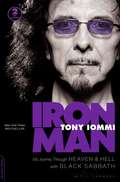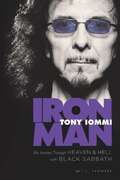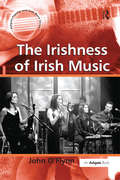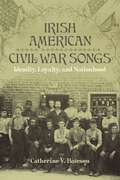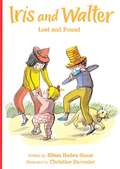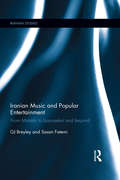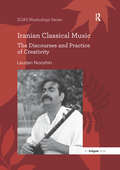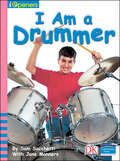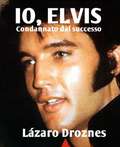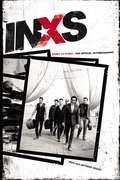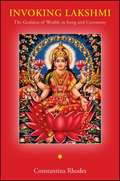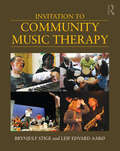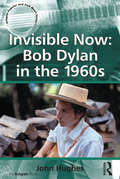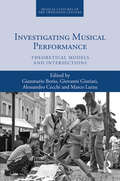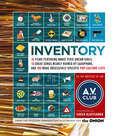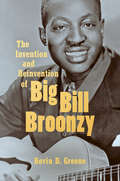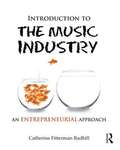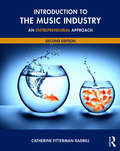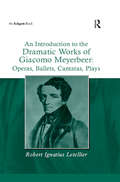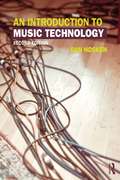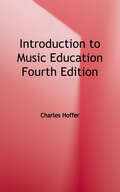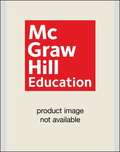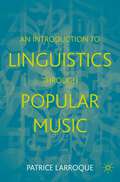- Table View
- List View
Iron Man: My Journey through Heaven and Hell with Black Sabbath
by Tony IommiTony Iommi, rock guitarist and Black Sabbath legend, invented the heavy metal sound that changed rock music forever . . . from working class Midlands roots, Tony Iommi's unique playing style - a result of a disfiguring hand injury he suffered working in a sheet metal factory - created a dark and gothic sound unlike anything that had been heard before, spawning generations of devoted fans. Black Sabbath went on to become a superband, and Iommi led the life of a rockstar to the fullest - with the scars from all the nights of wild excess to show for it. In Iron Man, Iommi goes on the record about Sabbath and tells his story: the life and adventures of one of rock's greatest heroes. 'Tony Iommi is the true father of Heavy Metal, a continuously creative genius riff-meister, and one of the world's great human beings' Brian May 'Without Tony, heavy metal wouldn't exist. He is the creator of heavy! Tony is a legend. He took rock and roll and turned it into heavy metal' Eddie van Halen 'Mr Iommi, aka . . . The riffmaster. It's all his fault I am where I am' James 'papa HET' Hetfield
Iron Man
by Tony IommiIron Man chronicles the story of both pioneering guitarist Tony Iommi and legendary band Black Sabbath, dubbed "The Beatles of heavy metal" by Rolling Stone. Iron Man reveals the man behind the icon yet still captures Iommi's humor, intelligence, and warmth. He speaks honestly and unflinchingly about his rough-and-tumble childhood, the accident that almost ended his career, his failed marriages, personal tragedies, battles with addiction, band mates, famous friends, newfound daughter, and the ups and downs of his life as an artist.Everything associated with hard rock happened to Black Sabbath first: the drugs, the debauchery, the drinking, the dungeons, the pressure, the pain, the conquests, the company men, the contracts, the combustible drummer, the critics, the comebacks, the singers, the Stonehenge set, the music, the money, the madness, the metal.
The Irishness of Irish Music
by John O'FlynnThis book brings together important material from a range of sources and highlights how government organizations, musicians, academics and commercial companies are concerned with, and seek to use, a particular notion of Irish musical identity. Rooting the study in the context of the recent history of popular, traditional and classical music in Ireland, as well as providing an overview of aspects of the national field of music production and consumption, O'Flynn goes on to argue that the relationship between Irish identity and Irish music emerges as a contested site of meaning. His analysis exposes the negotiation and articulation of civic, ethnic and economic ideas within a shifting hegemony of national musical culture, and finds inconsistencies between and among symbolic constructions of Irish music and observed patterns in the domestic field. More specifically, O'Flynn illustrates how settings, genres, social groups and values can influence individual identifications or negations of Irishness in music. While the apprehension of intra-musical elements leads to perceptions of music that sounds Irish, style and authenticity emerge as critical articulatory principles in the identification of music that feels Irish. The celebratory and homogenizing discourse associated with the international success of some Irish musical forms is not reflected in the opinions of the people interviewed by O'Flynn; at the same time, an insider/outsider dialectic of national identity is found in various forms of discourse about Irish music. Performers and composers discussed include Bill Whelan (Riverdance), Sinead O'Connor, The Corrs, Altan, U2, Martin Hayes, Dolores Keane and Gerald Barry.
Irish American Civil War Songs: Identity, Loyalty, and Nationhood (Conflicting Worlds: New Dimensions of the American Civil War)
by Catherine V. BatesonIrish-born and Irish-descended soldiers and sailors were involved in every major engagement of the American Civil War. Throughout the conflict, they shared their wartime experiences through songs and song lyrics, leaving behind a vast trove of ballads in songbooks, letters, newspaper publications, wartime diaries, and other accounts. Taken together, these songs and lyrics offer an underappreciated source of contemporary feelings and opinions about the war.Catherine V. Bateson’s Irish American Civil War Songs provides the first in-depth exploration of Irish Americans’ use of balladry to portray and comment on virtually every aspect of the war as witnessed by the Irish on the front line and home front. Bateson considers the lyrics, themes, and sentiments of wartime songs produced in America but often originating with those born across the Atlantic in Ireland and Britain. Her analysis gives new insight into views held by the Irish migrant diaspora about the conflict and the ways those of Irish descent identified with and fought to defend their adopted homeland. Bateson’s investigation of Irish American song lyrics within the context of broader wartime experiences enhances our understanding of the Irish contribution to the American Civil War. At the same time, it demonstrates how Irish songs shaped many American balladry traditions as they laid the foundation of the Civil War’s musical soundscape.
Iris and Walter: Lost and Found
by Elissa Haden Guest Christine DavenierWalter loves his grandmother's harmonica. But when he lets Iris borrow it the night before his grandmother comes to visit, something awful happens--it disappears! How will Iris break the news to Walter?
Iranian Music and Popular Entertainment: From Motrebi to Losanjelesi and Beyond (Iranian Studies)
by Sasan Fatemi Gj BreyleyThe word motreb finds its roots in the Arabic verb taraba, meaning 'to make happy.' Originally denoting all musicians in Iran, motrebi came to be associated, pejoratively, with the cheerful vulgarity of the lowbrow entertainer. In Iranian Music and Popular Entertainment, GJ Breyley and Sasan Fatemi examine the historically overlooked motrebi milieu, with its marginalized characters, from luti to gardan koloft and mashti, as well as the tenacity of motreb who continued their careers against all odds. They then turn to losanjelesi, the most pervasive form of Iranian popular music that developed as motrebi declined, and related musical forms in Iran and its diasporic popular cultural centre, Los Angeles. For the first time in English, the book makes available musical transcriptions, analysis and lyrics that illustrate the complexities of this history. As it presents the findings of the authors' years of ethnographic work with the history's protagonists, from senior motreb to pop-rock stars, the book reveals parallels between the decline of motrebi and the rise of 'modernity.' In the twentieth century, the fate of Tehran's motrebi music was shaped by the social and urban polarization that ensued from the modern market economy, and losanjelesi would be similarly affected by transnational relations, revolution, war and migration. Through its detailed and informed examination of Iranian popular music, this study reveals much about the values and anxieties of Iranian society, and is a valuable resource for students and scholars of Iranian society and history.
Iranian Classical Music: The Discourses and Practice of Creativity (SOAS Studies in Music Series)
by Laudan NooshinQuestions of creativity, and particularly the processes which underlie creative performance or ’improvisation’, form some of the central areas of interest in current musicology. Yet the predominant discourses on which musicological thought in this area are based have rarely been challenged. In this book Laudan Nooshin interrogates musicological discourses of creativity from the perspective of critical theory and postcolonial studies, examining their ideological underpinnings, the relationships of alterity which they sustain, and the profound implications for our understanding of creative processes in music. The repertoire which forms the book’s main focus is Iranian classical music, a tradition in which the performer plays a central creative role. Addressing a number of issues regarding the nature of musical creativity, the author explores both the discourses through which ideas about creativity are constructed, exchanged and negotiated within this tradition, and the practice by which new music comes into being. For the latter she compares a number of performances by musicians playing a range of instruments and spanning a period of more than 30 years, focusing on one particular section of repertoire, dastgāh Segāh, and providing transcriptions of the performances as the basis for analytical exploration of the music’s underlying compositional principles. This book is about understanding musical creativity as a meaningful social practice. It is the first to examine the ways in which ideas about tradition, authenticity, innovation and modernity in Iranian classical music form part of a wider social discourse on creativity, and in particular how they inform debates regarding national and cultural identity.
iOpener: I am a Drummer (iOpeners)
by Jane Manners Sam SacchettiIn I Am a Drummer, schoolchildren will read about Sam, a young drummer, and all the different ways he plays the drums. This title features clear photography, bright colors, and contains a lot of noisy words that are fun to read aloud. This 32-word book has discussion questions at the back to encourage reading comprehension.Grade: KindergartenSubject: Physical ScienceGenre: Biography/AutobiographyComprehension Skill/Strategy: Make InferencesDiagnostic Reading Assessment (DRA/EDL): 6Guided Reading Level: DLexile Level: 6DK's iOpeners equip K-6 students with the skills and strategies they need to access and comprehend nonfiction so that they are not only learning to read but reading to learn. The combination of high-interest content and eye-popping photography of iOpeners brings science and social studies topics to life, raises student achievement in reading, and boosts standardized test scores.
IO, ELVIS: Condannato dal successo.
by Lázaro Droznes Barbara BertoliniElvis Presley fu un personaggio incredibile, che rimane tuttora un punto di riferimento nel panorama musicale mondiale. La sua vita è costellata di successi, ma il ritmo frenetico e l'intensità con cui la vivette l'artista lo portarono alla sua prematura fine. In questa biografia Elvis ci racconta la sua storia, senza tralasciare nulla. Lo fa parlandoci in modo schietto e usando come intermezzo le sue canzoni. Un essere umano straordinario travolto dall'enorme successo e dalla fama, la cui storia ci insegna che una leggenda non muore mai.
INXS: Story to Story
by Anthony Bozza Inxs PublicationsTHE REAL STORY BEHIND INXS'S RISE TO FAME -- AND HOW THEY HELPED DEFINE THE MUSIC OF A GENERATION. INXS broke new musical ground. This Australian band, made up of three brothers and their three best mates, took the world by storm, turning rock, pop, and funk into a cutting edge, danceable style, and selling more than thirty million albums worldwide. INXS: Story to Story tells the tale of their incredible journey, from playing the world's biggest concert venues to living a high life rivaling any in rock history, filled with sex, drugs, and supermodels. Now for the first time, they reveal everything they experienced in their more than two decades of making music -- the partying, the pressure, the wild times on the road, the heights and depths of rock-star life, and the bonds of brotherhood and friendship that not only got them through the tough times but made the fun times even more intense. They also talk about the sadness of watching their closest friend and collaborator, Michael Hutchence, slipping away from them, and share their thoughts about why he left them far too soon. Fully authorized and reflecting the band's firsthand point of view, this is the real story behind the phenomenon that is INXS -- and the book every rock fan will need to own.
Invoking Lakshmi: The Goddess Of Wealth In Song And Ceremony
by Constantina RhodesBeautiful, beloved Lakshmi is the Hindu goddess of wealth, happiness, and abundant good fortune. This fascinating book is the first comprehensive guide to this celebrated goddess, her worship, and the deeper spiritual domain of prosperity she reveals. Constantina Rhodes presents over five hundred elegantly translated Sanskrit verses, including devotional songs, mantras, visualizations, and ceremonial instructions that devotees use to invoke Lakshmi. Rhodes uses these texts to develop a richly detailed portrait of Lakshmi, revealing unexpected dimensions of this enigmatic deity. Even as Lakshmi is best known as a goddess of wealth and well-being, she also maintains a strong esoteric presence, expressing herself as Siddhi, the magnificent Tantric goddess of spiritual power, and as Kundalini Shakti, the transformative cosmic force that exists within each individual. These identities express the prosperity consciousness that is the essential nature of the goddess and the divine source of all wealth. Invoking Lakshmi is not only a matter of calling upon the external form of the goddess but also of aligning one s consciousness with the very essence of prosperity
Invitation to Community Music Therapy
by Brynjulf Stige Leif Edvard AarøInvitation to Community Music Therapy presents the main perspectives and principles of community music therapy as it is practiced around the world. A relatively recent development within the broader field of music therapy, community music therapy emphasizes human connectedness, health promotion, and social change. This textbook surveys the history, theory, and current practice of community music therapy to develop a comprehensive picture of the field. Along the way it takes full measure of the diverse and vibrant ways community music therapy is practiced around the globe. Including dozens of photographs and pedagogical tools such as chapter questions, textboxes, figures, key terms, and discussion topics, Invitation to Community Music Therapy is the ideal introduction to a growing area of music therapy.
Invisible Now: Bob Dylan In The 1960s (Ashgate Popular and Folk Music Series)
by John HughesInvisible Now describes Bob Dylan's transformative inspiration as artist and cultural figure in the 1960s. Hughes identifies Dylan's creativity with an essential imaginative dynamic, as the singer perpetually departs from a former state of inexpression in pursuit of new, as yet unknown, powers of self-renewal. This motif of temporal self-division is taken as corresponding to what Dylan later referred to as an artistic project of 'continual becoming', and is explored in the book as a creative and ethical principle that underlies many facets of Dylan's appeal. Accordingly, the book combines close discussions of Dylan's mercurial art with related discussions of his humour, voice, photographs, and self-presentation, as well as with the singularities of particular performances. The result is a nuanced account of Dylan's creativity that allows us to understand more closely the nature of Dylan's art, and its links with American culture.
Investigating Musical Performance: Theoretical Models and Intersections (Musical Cultures of the Twentieth Century)
by Gianmario Borio Giovanni Giuriati Alessandro Cecchi Marco LutzuInvestigating Musical Performance considers the wide range of perspectives on musical performance made tangible by the cross-disciplinary studies of the last decades and encourages a comparison and revision of theoretical and analytical paradigms. The chapters present different approaches to this multi-layered phenomenon, including the results of significant research projects. The complex nature of musical performance is revealed within each section which either suggests aspects of dialogue and contiguity or discusses divergences between theoretical models and perspectives. Part I elaborates on the history, current trends and crucial aspects of the study of musical performance; Part II is devoted to the development of theoretical models, highlighting sharply distinguished positions; Part III explores the relationship between sign and sound in score-based performances; finally, the focus of Part IV centres on gesture considered within different traditions of musicmaking. Three extra chapters by the editors complement Parts I and III and can be accessed via the online Routledge Music Research Portal. The volume shows actual and possible connections between topics, problems, analytical methods and theories, thereby reflecting the wealth of stimuli offered by research on the musical cultures of our times.
Inventory
by Chuck Klosterman A. V. ClubEach week, the writers of The A.V. Club issue a slightly slanted pop-culture list filled with challenging opinions (Is David Bowie's "Young Americans" nearly ruined by saxophone?) and fascinating facts. Exploring 24 great films too painful to watch twice, 14 tragic movie-masturbation scenes, 18 songs about crappy cities, and much more, Inventory combines a massive helping of new lists created especially for the book with a few favorites first seen at avclub.com and in the pages of The A.V. Club's sister publication, The Onion. But wait! There's more: John Hodgman offers a set of minutely detailed (and probably fictional) character actors. Patton Oswalt waxes ecstatic about the "quiet film revolutions" that changed cinema in small but exciting ways. Amy Sedaris lists 50 things that make her laugh. "Weird Al" Yankovic examines the noises of Mad magazine's Don Martin. Plus lists from Paul Thomas Anderson, Robert Ben Garant, Tom Lennon, Andrew W.K., Tim and Eric, Daniel Handler, and Zach Galifianakis -- and an epic foreword from essayist Chuck Klosterman.
The Invention of Beethoven and Rossini
by Nicholas Mathew Benjamin WaltonBeethoven and Rossini have always been more than a pair of famous composers. Even during their lifetimes, they were well on the way to becoming 'Beethoven and Rossini' – a symbolic duo, who represented a contrast fundamental to Western music. This contrast was to shape the composition, performance, reception and historiography of music throughout the nineteenth and twentieth centuries. The Invention of Beethoven and Rossini puts leading scholars of opera and instrumental music into dialogue with each other, with the aim of unpicking the origins, consequences and fallacies of the opposition between the two composers and what they came to represent. In fifteen chapters, contributors explore topics ranging from the concert lives of early nineteenth-century capitals to the mythmaking of early cinema, and from the close analysis of individual works by Beethoven and Rossini to the cultural politics of nineteenth-century music histories.
The Invention and Reinvention of Big Bill Broonzy
by Kevin D. GreeneOver the course of his long career, legendary bluesman William "Big Bill" Broonzy (1893–1958) helped shape the trajectory of the genre, from its roots in the rural Mississippi River Delta, through its rise as a popular genre in the North, to its eventual international acclaim. Along the way, Broonzy adopted an evolving personal and professional identity, tailoring his self-presentation to the demands of the place and time. His remarkable professional fluidity mirrored the range of expectations from his audiences, whose ideas about race, national belonging, identity, and the blues were refracted through Broonzy as if through a prism. Kevin D. Greene argues that Broonzy's popular success testifies to his ability to navigate the cultural expectations of his different audiences. However, this constant reinvention came at a personal and professional cost. Using Broonzy's multifaceted career, Greene situates blues performance at the center of understanding African American self-presentation and racial identity in the first half of the twentieth century. Through Broonzy's life and times, Greene assesses major themes and events in African American history, including the Great Migration, urbanization, and black expatriate encounters with European culture consumers. Drawing on a range of historical source materials as well as oral histories and personal archives held by Broonzy's son, Greene perceptively interrogates how notions of race, gender, and audience reception continue to shape concepts of folk culture and musical authenticity.
Introduction to the Music Industry: An Entrepreneurial Approach
by Catherine Fitterman RadbillIntroduction to the Music Industry: An Entrepreneurial Approach is an introductory textbook that offers a fresh look at one of the fastest-changing businesses in the world today. Emphasizing the importance of entrepreneurial thinking for the music industry, this textbook engages college-level students in learning the fundamentals of the music business while discovering ways to shape the industry's future. Every chapter explores the inner workings of the music industry, using creative problem-solving exercises, discussion questions, collaborative projects, case studies, hands-on activities, and inspiring stories of actual music entrepreneurs. The textbook's companion website provides multi-media content, study guides, and an instructor's manual with lesson plans and suggestions for assessing students' work. This book will be beneficial to students who want to learn the basics of the music industry and be involved in some way, whether a professional working in support of artists, or an artist trying to launch his or her performing career.
Introduction to the Music Industry: An Entrepreneurial Approach, Second Edition
by Catherine Fitterman RadbillIntroduction to the Music Industry: An Entrepreneurial Approach, Second Edition is an introductory textbook that offers a fresh perspective in one of the fastest-changing businesses in the world today. It engages students with creative problem-solving activities, collaborative projects and case studies as they explore the inner workings of the music business, while encouraging them to think like entrepreneurs on a path toward their own successful careers in the industry. This new edition includes a revised chapter organization, with chapters streamlined to focus on topics most important to music business students, while also maintaining its user-friendly chapter approach. Supported by an updated companion website, this book equips music business students and performance majors with the knowledge and tools to adopt and integrate entrepreneurial thinking successfully into practice and shape the future of the industry.
An Introduction to the Dramatic Works of Giacomo Meyerbeer: Operas, Ballets, Cantatas, Plays
by Robert Ignatius LetellierGiacomo Meyerbeer (1791-1864) was a great musical dramatist in his own right. The fame of his operas rests on his radical treatment of form, his development of scenic complexes and greater plasticity of structure and melody, his dynamic use of the orchestra, and close attention to all aspects of presentation and production, all of which set new standards in Romantic opera and dramaturgy. This book carries forward the process of rediscovery and reassessment of Meyerbeer‘s artincluding not just his famous French operas, but also his German and Italian ones placing them in the context of his entire dramatic oeuvre, including his ballets, oratorios, cantatas and incidental music. From Meyerbeer‘s first stage presentation in 1810 to his great posthumous accolade in 1865, some 24 works mark the unfolding of this life lived for dramatic music. The reputation of the famous four grand operas may well live on in the public consciousness, but the other works remain largely unknown. This book provides an approachable introduction to them. The works have been divided into their generic types for quick reference and helpful association, and placed within the context of the composer‘s life and artistic development. Each section unfolds a brief history of the work‘s origins, an account of the plot, a critical survey of some of its musical characteristics, and a record of its performance history. Robert Letellier examines each work from a dramaturgical view point, including the essential often challenging philosophical and historical elements in the scenarios, and how these concepts were translated musically onto the stage. A series of portraits and stage iconography assist in bringing the works to life.
An Introduction to Music Therapy Theory and Practice Third Edition
by William B. Davis Kate E. Gfeller Michael H. Thaut"An Introduction to Music Therapy: Theory and Practice, third edition, provides a comprehensive overview of the practice of music therapy for the 21st century. It looks at where we have been, where we are today, and where we might be in the future. Combining sound pedagogy with recent research findings, this new edition has been updated and expanded to reflect changes in music therapy practice over the past nine years.
An Introduction to Music Technology
by Dan HoskenAn Introduction to Music Technology, Second Edition provides a clear overview of the essential elements of music technology for today's musician. This book focuses on the topics that underlie the hardware and software in use today: Sound, Audio, MIDI, Computer Notation, and Computer- Assisted Instruction. Appendices cover necessary computer hardware and software concepts. Written for both music technology majors and non-majors, this textbook introduces fundamental principles and practices so students can learn to work with a wide range of software programs, adapt to new music technologies, and apply music technology in their performance, composition, teaching, and analysis. Features: Thorough explanations of key topics in music technology Content applicable to all software and hardware, not linked to just one piece of software or gear In-depth discussion of digital audio topics, such as sampling rates, resolutions, and file formats Explanations of standard audio plug-ins including dynamics processors, EQs, and delay based effects Coverage of synthesis and sampling in software instruments Pedagogical features, including: Further Reading sections that allow the student to delve deeper into topics of interest Suggested Activities that can be carried out with a variety of different programs Key Terms at the end of each chapter What Do I Need? Chapters covering the types of hardware and software needed in order to put together Audio and MIDI systems A companion website with links to audio examples that demonstrate various concepts, step-by-step tutorials, relevant hardware, software, and additional audio and video resources. The new edition has been fully updated to cover new technologies that have emerged since the first edition, including iOS and mobile platforms, online notation software, alternate controllers, and Open Sound Control (OSC).
Introduction to Music Education
by Charles HofferThe streamlined Fourth Edition of this widely adopted text introduces prospective school music teachers to the profession of music education by one of the field's respected senior practitioners. In a warm, approachable style, Hoffer presents a working repertoire of concepts and general information, gets readers thinking about music teaching, and encourages them to examine themselves in terms of their future roles as educators in the field.Introduction to Music Education, 4/E provides a comprehensive, straightforward overview of the field, including its opportunities and its challenges. The text is written for a general music education course that precedes methods courses in which prospective teachers learn techniques for teaching various aspects of music. In addition to Hoffer's uncluttered discussions of the nature of teaching, teachers, and music, useful chapter components such as questions for discussion and projects are included.
An Introduction to Music and Art in the Western World (10th edition)
by Milo Wold Edmund Cykler Gary Martin James MillerAn undergraduate introduction to the music, painting, sculpture, and architecture of the Western world, featuring chapter objectives and summaries, pronunciation guides, and chronologies. Covers various periods from the ancient Greeks through the arts today, and includes material on the arts and society and the organization of the elements of art and music. This 10th edition contains increased recognition of women and minority artists, and boxes on selected individual works. Annotation c. by Book News, Inc., Portland, Or.
An Introduction to Linguistics through Popular Music
by Patrice LarroqueThis textbook introduces the field of linguistics, demonstrating syntactic categories, morphological structures, phonological/metric structures, syllable structures, and varieties of English in an accessible way by using portions of song lyrics from popular music. The varieties of English covered include Received Pronunciation (RP) and General American, as well as some features of Australian English, southern US varieties, and Scottish English. Drawing on shared characteristics between language and music, including metrical structure, the author suggests a different approach to linguistic analysis and the description of spoken language. The book introduces both students and instructors to a novel and engaging method of description, and provides a fresh vocabulary with which to start thinking about language. It demonstrates complex topics by using music as a fun and familiar starting point, and will be an ideal resource for introductory linguistics courses worldwide.
